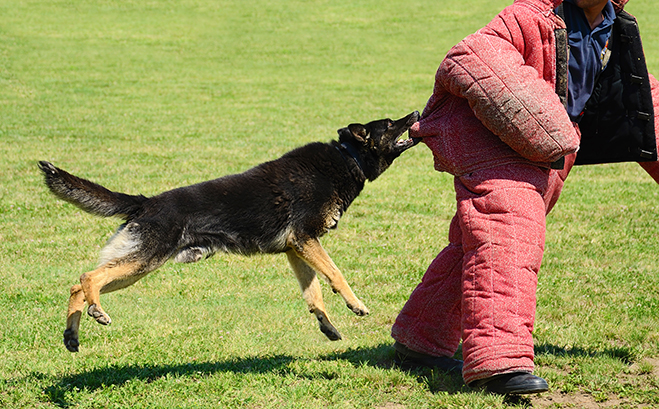Training K9s for the Police Force
August 15, 2019 by Dana Rasmussen

When it comes to training dogs to work in law enforcement, the most important thing to remember is that every dog is different. Officer Lisa Koeppel of the Cheyenne Police Department in Wyoming has trained two police dogs and her experience highlights that sentiment.
Koeppel’s most recent K9 partner Capo retired after the successful completion of his successor’s training program. But when Capo was going through the process of becoming a certified patrol dog, he was what the industry refers to as a “hard” dog.
According to Koeppel, hard dogs like Capo are stubborn and discipline does not phase them. Capo was never interested in being the type of dog that could visit schools and show off his softer side. Instead, he was interested in doing his job, doing it well, and going home with his handler.
Koeppel’s new partner, Tyler, has all of the tenacity and dedication required of a K9 partner, but she’ll also allow children to pet her and she responds well to the emotions of her partner.
“I wanted a different experience handling a dog this time,” Koeppel said. “I wanted a dog that I didn’t have to worry about biting everyone she saw. But with this softer type of dog, there are still obstacles.”
With Tyler possessing softer skills, she is more in tune with the emotions of her handler, which means that she feels her handler’s frustrations, and can shut down if the stress becomes too high.
“I have to be careful with how I discipline Tyler,” Koeppel said. “With Capo never cared if I was mad or frustrated and would work through almost any form of discipline. Tyler will not. Capo and most other hard dogs are motivated by positive punishment. They are motivated to do things simply to avoid punishment.”
That said, Tyler was a “dream to train,” according to Koeppel. She responded well with positive reinforcement and required little discipline. She learned the bark and hold method – which means the dog will detain a suspect by getting close to the individual and barking, but not biting – in less than a week. In most instances, dogs take 3-6 weeks to learn this skill.
In addition, Tyler response to positive reinforcement was so strong that she learned how to hunt for narcotics with such precision and tenacity that she is sometimes distracted by her own skill.
“She likes to hunt for narcotics so much that sometimes it poses a problem for patrol work,” Koeppel said. “Sometimes when I’m trying to get her to search a building for a human, she wants to stop and search for narcotics instead. This is almost the exact opposite from Capo. He wanted to bite first and find dope later. However, even though her patrol drives aren’t as strong, teaching her the out commands and apprehension were miles easier than with Capo. Again, this is due to her willingness to accept positive reinforcement rather than positive punishment.”
Tyler’s training process lasted 50 hours a week for 12 weeks. She would continue to be trained on weekends as well with Koeppel. In this time, it’s important to continue the bonding process so that the dog always feels a connection to his or her handler.
*In October 2017, the Cheyenne Police Department won a grant from Tyler Technologies to fund a K9 unit as a part of Tyler’s commitment to making communities safer together. To provide this grant, Tyler Technologies worked with Sean’s K-9s, an organization committed to providing grants to law enforcement agencies in need of financial support to establish or maintain their K-9 teams. Follow along with this series as it details the Cheyenne PD, Officer Lisa Koeppel, and her new K9, named Tyler.